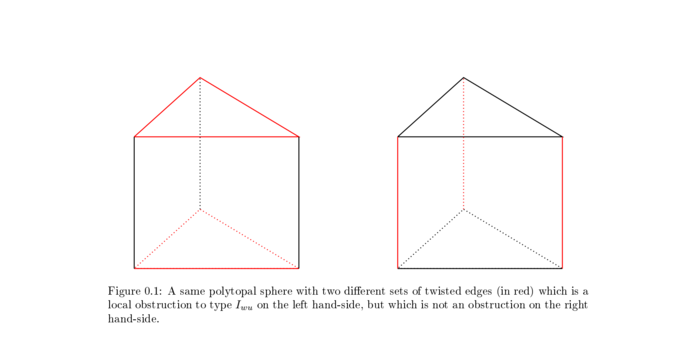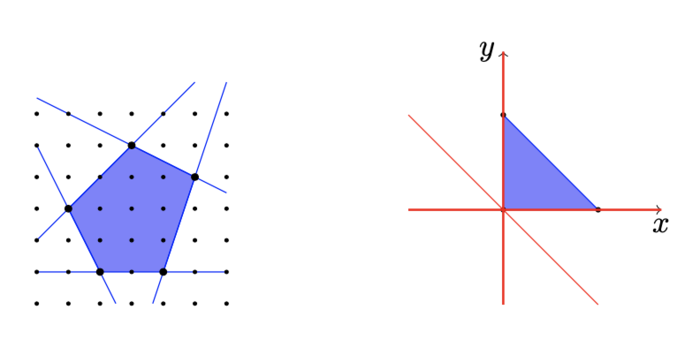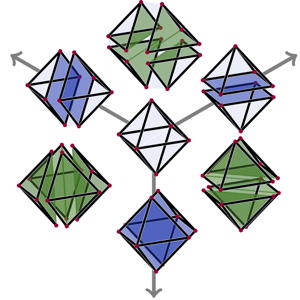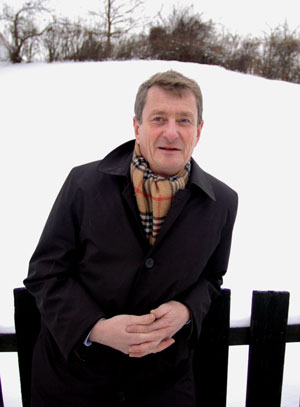Conferences
Upcoming
The 5th Scandinavian Gathering Around Remarkable Discrete Mathematics
Previous
Phase tropical surfaces can appear as a limit of a 1-parameter family of smooth complex algebraic surfaces. A phase tropical surface admits a stratified fibration over a smooth tropical surface. We study the real structures compatible with this fibration and give a description in terms of tropical cohomology. As an application, we deduce combinatorial criteria for the type of a real structure of a phase tropical surface.
Phase tropical surfaces can appear as a limit of a 1-parameter family of smooth complex algebraic surfaces. A phase tropical surface admits a stratified fibration over a smooth tropical surface. We study the real structures compatible with this fibration and give a description in terms of tropical cohomology. As an application, we deduce combinatorial criteria for the type of a real structure of a phase tropical surface.
In 1962 Ehrhart proved that the number of lattice points in integer dilates of a lattice polytope is given by a polynomial — the Ehrhart polynomial of the polytope. Since then Ehrhart theory has developed into a very active area of research at the intersection of combinatorics, geometry and algebra.
The Ehrhart polynomial encodes important information about the polytope such as its volume and the dimension. An important tool to study Ehrhart polynomials is the h*-polynomial, a linear transform of the Ehrhart polynomial which is given by the numerator of the generating series. By a famous theorem of Stanley the coefficients of the h*-polynomial are always nonnegative integers. In this talk, we discuss generalizations of this result to weighted lattice point enumeration in rational polytopes where the weight function is given by a polynomial. In particular, we show that Stanley’s Nonnegativity Theorem continues to hold if the weight is a sum of products of linear forms that a nonnegative over the polytope. This is joint work with Esme Bajo, Robert Davis, Jesús De Loera, Alexey Garber, Sofía Garzón Mora and Josephine Yu.
In 1962 Ehrhart proved that the number of lattice points in integer dilates of a lattice polytope is given by a polynomial — the Ehrhart polynomial of the polytope. Since then Ehrhart theory has developed into a very active area of research at the intersection of combinatorics, geometry and algebra.
The Ehrhart polynomial encodes important information about the polytope such as its volume and the dimension. An important tool to study Ehrhart polynomials is the h*-polynomial, a linear transform of the Ehrhart polynomial which is given by the numerator of the generating series. By a famous theorem of Stanley the coefficients of the h*-polynomial are always nonnegative integers. In this talk, we discuss generalizations of this result to weighted lattice point enumeration in rational polytopes where the weight function is given by a polynomial. In particular, we show that Stanley’s Nonnegativity Theorem continues to hold if the weight is a sum of products of linear forms that a nonnegative over the polytope. This is joint work with Esme Bajo, Robert Davis, Jesús De Loera, Alexey Garber, Sofía Garzón Mora and Josephine Yu.
In this talk we define a new category of matroids, by working on matroid polytopes and rank preserving weak maps. This lets us introduce the concept of categorical valuativity for functors, which can be seen as a categorification of the ordinary valuativity for matroid invariants.
We also show that this new theory agrees with what we know about valuative polynomials: several known valuative polynomials can be seen as a Hilbert series of some graded vector space and we prove that these graded vector spaces let us define a valuative functor in the new sense.
Lastly, we sketch how to categorify a Theorem by Ardila and Sanchez, which states that the convolution of two valuative invariants (respectively, valuative functors) is again valuative.
This is based on a joint ongoing project with Ben Elias, Dane Miyata and Nicholas Proudfoot.
In this talk we define a new category of matroids, by working on matroid polytopes and rank preserving weak maps. This lets us introduce the concept of categorical valuativity for functors, which can be seen as a categorification of the ordinary valuativity for matroid invariants.
We also show that this new theory agrees with what we know about valuative polynomials: several known valuative polynomials can be seen as a Hilbert series of some graded vector space and we prove that these graded vector spaces let us define a valuative functor in the new sense.
Lastly, we sketch how to categorify a Theorem by Ardila and Sanchez, which states that the convolution of two valuative invariants (respectively, valuative functors) is again valuative.
This is based on a joint ongoing project with Ben Elias, Dane Miyata and Nicholas Proudfoot.
Oslo Stability and Enumerative Geometry Workshop 2023
Nordfjordeid Summer school 2022
The 5th Scandinavian Gathering Around Remarkable Discrete Mathematics
The 4th Scandinavian Gathering Around Remarkable Discrete Mathematics
A conference in algebraic geometry on the occasion of Geir Ellingsrud’s 70th birthday
Nordfjordeid Summer school 2018
The third Scandinavian Gathering Around Remarkable Discrete Mathematics
The second Scandinavian Gathering Around Remarkable Discrete Mathematics
A conference celebrating the work of Ragni Piene on the occasion of her 70th birthday.
A Scandinavian Gathering Around Remarkable Discrete Mathematics










.jpg?alt=listing)